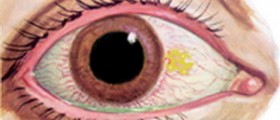
Proptosis (exophthalmos) is a condition characterized by forward displacement of the eyes. Even though some people may be born with slightly protruded eyeballs, others develop the condition after some time, usually due to some underlying condition. Sudden proptosis is considered dangerous and may cause severe complications.
Causes of Proptosis
Many times exophthalmos develops as a consequence of tumor growing either inside the eyeball or behind the eyeball, when it simply pushes the eyeball out of the eye socket. Eye cancer is not so common medical condition. The very presence of tumor can be easily confirmed because in such case only one eye is affected i.e. only one eyeball sticks out. In the majority of cases retinoblastoma leads to such bulging. As far as retinoblastoma is concerned, this is the only tumor that can affect both eyes. It stems from the retinal cells. Another malignant tumor that affects the eye is malignant melanoma. Malignant melanoma may form in each tissue containing melanocytes. In the eye these cells are normally found in the iris, choroid, ciliary body and conjunctiva. It affects only one eye.
Another eye condition causing proptosis is glaucoma. Patients suffering from glaucoma have increased intraocular pressure. In most patients the appearance of the eyeball remains the same except when build-up of the aqueous humor is rapid and extreme which may cause slight bulging of the eyeballs.
Bulging of the eye may also occur if there is bleeding behind the eyeball. Similar effects occurs in case of some infections such as orbital cellulitis.
Finally, bulging eyes are typical sign of Grave's disease. This is an autoimmune disease characterized by increased production of thyroid hormones. The antibodies which attack the thyroid gland may also attack connective tissue around the eyeballs and cause eye protrusion.
Proptosis Evaluation
Sudden exophthalmos is an emergency condition which requires prompt diagnosis and suitable treatment.
If bulging, however, occurs gradually it is also not supposed to be neglected and one may visit his/her ophthalmologist who will, after certain tests and exams, identify the underlying cause of eyeball protrusion. Many times patients additionally undergo MRI of the eye region, blood tests, ultrasound and sometimes even biopsy.
As far as treatment is concerned, patients may be treated conservatively or surgically. Mild forms of proptosis are only monitored. Glaucoma is treated with drugs and/or surgery. Severe exophthalmos, when patients cannot close their eyes which subsequently leads to dry eye and irritation as well as bulging caused by tumors require surgery.

















Your thoughts on this
Loading...